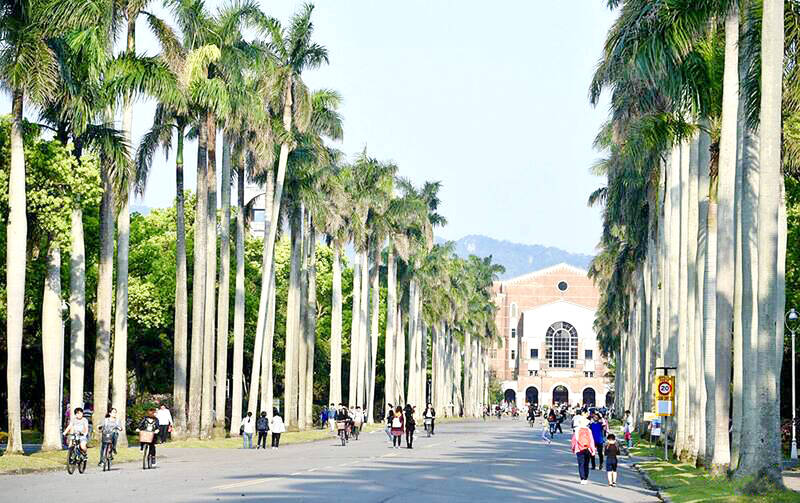National Taiwan University (NTU) has been ranked the 152nd best university in the latest Times Higher Education (THE) rankings, moving up 35 places.
In the THE rankings released on Wednesday, NTU remained the best-performing Taiwanese university on the list.
THE chief global affairs officer Phil Baty, said he was glad to see NTU retain its spot in the top 200 universities in the world after years of unstable performances in the rankings.

Photo: Lo Pei-de, Taipei Times
Next year’s World University Rankings covered 1,904 higher-learning institutions across 108 countries and territories. It was the highest number of schools analyzed since the rankings were first published in 2011.
The latest rankings used 18 indicators to measure an institution’s performance across five areas: teaching, research, citations, knowledge transfer and international outlook.
Among the 10 top-ranked universities in Taiwan, China Medical University was in the 301-350 range while Asia University, National Taiwan University of Science and Technology, National Tsing Hua University, National Yang Ming Chiao Tung University and Taipei Medical University were ranked 401-500.
National Cheng Kung University, National Taiwan Normal University, and National Yunlin University of Science and Technology were ranked in the 501-600 range group, the report showed.
Meanwhile, the report said that the best university was the University of Oxford in England for the eighth consecutive year, followed by Stanford University, Massachusetts Institute of Technology and Harvard University.
In Asia, the top three universities in the report were China’s Tsinghua University (12th), Peking University (14th) and National University of Singapore (19th).

Global bodies should stop excluding Taiwan for political reasons, President William Lai (賴清德) told Pope Francis in a letter, adding that he agrees war has no winners. The Vatican is one of only 12 countries to retain formal diplomatic ties with Taiwan, and Taipei has watched with concern efforts by Beijing and the Holy See to improve ties. In October, the Vatican and China extended an accord on the appointment of Catholic bishops in China for four years, pointing to a new level of trust between the two parties. Lai, writing to the pope in response to the pontiff’s message on Jan. 1’s

A Vietnamese migrant worker on Thursday won the NT$12 million (US$383,590) jackpot on a scratch-off lottery ticket she bought from a lottery shop in Changhua County’s Puyan Township (埔鹽), Taiwan Lottery Co said yesterday. The lottery winner, who is in her 30s and married, said she would continue to work in Taiwan and send her winnings to her family in Vietnam to improve their life. More Taiwanese and migrant workers have flocked to the lottery shop on Sec 2 of Jhangshuei Road (彰水路) to share in the luck. The shop owner, surnamed Chen (陳), said that his shop has been open for just

HOLIDAY EXERCISE: National forest recreation areas from north to south offer travelers a wide choice of sights to connect with nature and enjoy its benefits Hiking is a good way to improve one’s health, the Forestry and Nature Conservation Agency said, as it released a list of national forest recreation areas that travelers can visit during the Lunar New Year holiday. Taking a green shower of phytoncides in the woods could boost one’s immunity system and metabolism, agency Director-General Lin Hwa-ching (林華慶) cited a Japanese study as saying. For people visiting northern Taiwan, Lin recommended the Dongyanshan National Forest Recreation Area in Taoyuan’s Fusing District (復興). Once an important plantation in the north, Dongyanshan (東眼山) has a number of historic monuments, he said. The area is broadly covered by

Tainan’s initiative to recruit digital nomads has resulted in several German, US and Vietnamese nationals applying to live and work in the city, the Tainan Research, Development and Evaluation Commission said yesterday. That marked the city as the first in the nation to attract digital nomads, following the launch of the program last month, it said. Although all applicants so far have used work visas or tourism visas instead of the special digital nomad permit from the Ministry of Foreign Affairs, the city government believes that the latter would be needed eventually, the commission said. The digital nomads recruited by Tainan would work